
Article
INEQUALITY IN TREATMENT BENEFITS: CAN WE DETERMINE IF A NEW TREATMENT BENEFITS THE MANY OR THE FEW?
Johns Hopkins University, Dept. of Biostatistics Working Papers
Date of this Version
12-7-2015
Abstract
The primary analysis in many randomized controlled trials focuses on the average treatment effect and does not address whether treatment benefits are widespread or limited to a select few. This problem affects many disease areas, since it stems from how randomized trials, often the gold standard for evaluating treatments, are designed and analyzed. Our goal is to learn about the fraction who benefit from a treatment, based on randomized trial data. We consider the case where the outcome is ordinal, with binary outcomes as a special case. In general, the fraction who benefit is a non-identifiable parameter, and the best that can be obtained are sharp lower and upper bounds on it. Our main contributions include (i) showing that the naive (plug-in) estimator of the bounds can be inconsistent, in the case that support restrictions are made on the joint distribution of the potential outcomes (such as the no harm assumption); (ii) developing the first consistent estimator for this case; (iii) applying this estimator to a randomized trial dataset of a medical treatment to determine whether the estimates can be informative. Our estimator is computed using linear programming, allowing fast implementation. R and MATLAB software are provided (https://github.com/emhuang1/fraction-who-benefit).
Disciplines
Citation Information
Emily Huang, Ethan Fang, Daniel Hanley and Michael Rosenblum. "INEQUALITY IN TREATMENT BENEFITS: CAN WE DETERMINE IF A NEW TREATMENT BENEFITS THE MANY OR THE FEW?" (2015) Available at: http://works.bepress.com/michael_rosenblum/27/